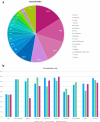Transforming cancer screening: the potential of multi-cancer early detection (MCED) technologies
- PMID: 39799530
- PMCID: PMC11785667
- DOI: 10.1007/s10147-025-02694-5
Transforming cancer screening: the potential of multi-cancer early detection (MCED) technologies
Abstract
Early cancer detection substantially improves the rate of patient survival; however, conventional screening methods are directed at single anatomical sites and focus primarily on a limited number of cancers, such as gastric, colorectal, lung, breast, and cervical cancer. Additionally, several cancers are inadequately screened, hindering early detection of 45.5% cases. In contrast, Multi-Cancer Early Detection (MCED) assays offer simultaneous screening of multiple cancers from a single liquid biopsy and identify molecular changes before symptom onset. These tests assess DNA mutations, abnormal DNA methylation patterns, fragmented DNA, and other tumor-derived biomarkers, indicating the presence of cancer and predicting its origin. Moreover, MCED assays concurrently detect multiple cancers without recommended screening protocols, potentially revolutionizing cancer screening and management. Large trials have reported promising results, achieving 50-95% sensitivity and 89-99% specificity for multiple cancer types. However, challenges, regarding improving accuracy, addressing ethical issues (e.g., psychosocial impact assessment), and integrating MCED into healthcare systems, must be addressed to achieve widespread adoption. Furthermore, prospective multi-institutional studies are crucial for demonstrating the clinical benefits in diverse populations. This review provides an overview of the principles, development status, and clinical significance of MCED tests, and discusses their potential and challenges.
Keywords: Cancer biomarkers; Cancer screening; Genomic sequencing; Liquid biopsy; Multi-cancer early detection; Oncology diagnostic technologies.
© 2025. The Author(s).
Conflict of interest statement
Declarations. Conflict of interest: M.I. reports advisory role from Sumitomo Co., Ltd., Exact Sciences Corporation.; speakers’ bureau from Chugai Pharmaceutical Co., Ltd.; research funding from Merck Sharp and Dohme, Inc. Y.N. reports advisory role from Guardant Health Pte Ltd., Natera, Inc., Roche Ltd., Seagen, Inc., Premo Partners, Inc., Daiichi Sankyo Co., Ltd., Takeda Pharmaceutical Co., Ltd., Exact Sciences Corporation, and Gilead Sciences, Inc.; speakers’ bureau from Guardant Health Pte Ltd., MSD K.K., Eisai Co., Ltd., Zeria Pharmaceutical Co., Ltd., Miyarisan Pharmaceutical Co., Ltd., Merck Biopharma Co., Ltd., CareNet, Inc., Hisamitsu Pharmaceutical Co., Inc., Taiho Pharmaceutical Co., Ltd., Daiichi Sankyo Co., Ltd., Chugai Pharmaceutical Co., Ltd., and Becton, Dickinson and Company, Guardant Health Japan Corp; research funding from Seagen Inc., Genomedia Inc., Guardant Health AMEA, Inc., Guardant Health, Inc., Tempus Labs, Inc., Roche Diagnostics K.K., Daiichi Sankyo Co., Ltd., and Chugai Pharmaceutical Co., Ltd. T.Y. reports honoraria from Chugai Pharmaceutical Co., Ltd., Takeda Pharmaceutical Co., Ltd., Merck Biopharma Co., Ltd., Bayer Yakuhin, Ltd., Ono Pharmaceutical Co., Ltd., and MSD K.K; consulting fee from Sumitomo Corp.; and research grant from Amgen K.K., Bristol-Myers Squibb K.K., Chugai Pharmaceutical Co., Ltd., Daiichi Sankyo Co., Ltd., Eisai Co., Ltd., FALCO biosystems Ltd., Genomedia Inc., Medical & Biological Laboratories Co., Ltd., Merus N.V., Molecular Health GmbH, MSD K.K., Nippon Boehringer Ingelheim Co., Ltd., Ono Pharmaceutical Co., Ltd., Pfizer Japan Inc., Roche Diagnostics K.K., Sanofi K.K., Sysmex Corp., Taiho Pharmaceutical Co., Ltd., and Takeda Pharmaceutical Co., Ltd. Ethical approval: This study did not involve human subjects or animal experiments, and therefore did not require ethical approval.
Figures


Similar articles
-
Clinical validation of a targeted methylation-based multi-cancer early detection test using an independent validation set.Ann Oncol. 2021 Sep;32(9):1167-1177. doi: 10.1016/j.annonc.2021.05.806. Epub 2021 Jun 24. Ann Oncol. 2021. PMID: 34176681
-
Combination of Hotspot Mutations With Methylation and Fragmentomic Profiles to Enhance Multi-Cancer Early Detection.Cancer Med. 2025 Jan;14(1):e70575. doi: 10.1002/cam4.70575. Cancer Med. 2025. PMID: 39748775 Free PMC article.
-
Multi-cancer early detection tests: Attributes for clinical implementation.Cancer Biomark. 2025 Feb;42(2):18758592241297849. doi: 10.1177/18758592241297849. Epub 2025 Apr 2. Cancer Biomark. 2025. PMID: 40171802
-
Multi-cancer early detection tests for general population screening: a systematic literature review.Health Technol Assess. 2025 Jan;29(2):1-105. doi: 10.3310/DLMT1294. Health Technol Assess. 2025. PMID: 39898371 Free PMC article.
-
Circulating cell-free DNA-based multi-cancer early detection.Trends Cancer. 2024 Feb;10(2):161-174. doi: 10.1016/j.trecan.2023.08.010. Epub 2023 Sep 14. Trends Cancer. 2024. PMID: 37709615 Review.
Cited by
-
Artificial Intelligence in cancer epigenomics: a review on advances in pan-cancer detection and precision medicine.Epigenetics Chromatin. 2025 Jun 14;18(1):35. doi: 10.1186/s13072-025-00595-5. Epigenetics Chromatin. 2025. PMID: 40517231 Free PMC article. Review.
-
AI-powered fragmentomics of cell-free DNA for early detection of multiple cancers.Nat Med. 2025 Aug;31(8):2504-2505. doi: 10.1038/s41591-025-03810-8. Nat Med. 2025. PMID: 40571756 No abstract available.
-
Development and clinical applications of liquid biopsy assays in cancer screening.Transl Cancer Res. 2025 Jun 30;14(6):3846-3859. doi: 10.21037/tcr-2025-272. Epub 2025 Jun 13. Transl Cancer Res. 2025. PMID: 40687260 Free PMC article. Review.
References
-
- Bray F, Laversanne M, Sung H et al (2024) Global cancer statistics 2022: GLOBOCAN estimates of incidence and mortality worldwide for 36 cancers in 185 countries. CA Cancer J Clin 74(3):229–263. 10.3322/caac.21834 - PubMed
-
- Ministry of Health, Labour and Welfare, Japan (2023) Vital statistics of Japan 2022 (final data). https://www.mhlw.go.jp/toukei/saikin/hw/jinkou/kakutei22/index.html. Accessed 9 Jan 2025
-
- Cancer Information Service, National Cancer Center, Japan. Annual Survival Report of Hospital-Based Cancer Registries. . https://hbcr-survival.ganjoho.jp/ Accessed 25 June 2024
-
- Kolb TM, Lichy J, Newhouse JH (2002) Comparison of the performance of screening mammography, physical examination, and breast US and evaluation of factors that influence them: an analysis of 27,825 patient evaluations. Radiology 225(1):165–175. 10.1148/radiol.2251011667 - PubMed
-
- Rex DK, Schoenfeld PS, Cohen J (2015) Quality indicators for colonoscopy. Gastrointest Endosc 81(1):31–53. 10.1016/j.gie.2014.07.058 - PubMed
Publication types
MeSH terms
Substances
LinkOut - more resources
Full Text Sources
Medical

